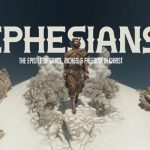“Is God for me?”
It’s a question I’ve asked myself countless times in moments of sickness, suffering, and hardship.
I easily answer “yes” when all is well. Of course, God is for me. I am healthy. I have a good job, a nice car, a roof over my head, and a wife – Jesse – who loves me.
But take one of those things away and the question becomes difficult. Is God for me when I’m not healthy? What if I lose my job, car, or apartment? What if something happens to my wife? I confess that sometimes, I hesitate to answer. My “yes” is too dependent on God’s material gifts instead of God himself.
I find I can answer wrongly in two ways. I can fall into emotionalism, relying too much on my physical circumstances to inform my spiritual state. Or I can shut down my emotions, retreating into cold intellectualism.
How do I escape one without falling into the other?
The Sons of Korah, in Psalms 42 and 43, guide both my emotions and intellect toward truth.
“As the deer pants for the water brooks,
So my soul pants for You, O God.
My soul thirsts for God, for the living God;
When shall I come and appear before God?” (Ps. 42:1-2).
So my soul pants for You, O God.
My soul thirsts for God, for the living God;
When shall I come and appear before God?” (Ps. 42:1-2).
The Psalmist pants, as the deer does; his parched soul thirsts for the living God. Nothing else will sate his desire. He needs God. He would die without him. This must be our starting point.
The Psalmist’s admission reminds me that my emotions matter. I am not a disembodied intellect: a walking, talking, living, breathing, computer. I am a man, made in the image of God. I am human, flesh and blood. Therefore, I feel. My doctrine need not be lifeless. It cannot be. I worship God, the living God – my doctrine must follow suit. Right thoughts about God lead to right feelings about God.
But I am not all emotion either. I may feel God is for me while I am going against his will. My emotions must be led by the Word of God, which requires my intellect. I have to read in order to obey. I must understand the command in order to follow it.
So the Psalmist appeals to his mind. Specifically, he tells himself to remember.
“These things I remember and I pour out my soul within me. For I used to go along with the throng and lead them in procession to the house of God, with the sound of a shout of joy and thanksgiving, a multitude keeping festival” (Ps. 42:4).
My mind calls to my heart: “Remember. God was good to me then. He remains good to me now.” Though the memories of the past good times can feel bittersweet in the midst of current difficulty, they do remind me to be thankful for his provision. Times of plenty come from God’s hand. So do times of drought and famine.
These two – the mind and the heart – blend in the first of the three refrains in these two Psalms.
“Why are you in despair, O my soul?
And why are you disturbed within me?
Wait for God, for I shall still praise Him,
The salvation of my presence and my God” (Ps. 42:11)
And why are you disturbed within me?
Wait for God, for I shall still praise Him,
The salvation of my presence and my God” (Ps. 42:11)
As a doctor diagnoses my physical health through a round of questioning, so I diagnose my own spiritual health through questions.
Why am I cast down? Why do I feel God is not for me? I used to sing praises to God in corporate worship. What happened? What changed?
As I read these Psalms I see why he is downcast. “Because of the oppression of the enemy.”
Evil men taunted him, using his physical condition to attack his God. His God is my God. A sickness can’t taunt, but it can infect and kill. And it can have the same effect on our souls as the scornful question: “Where is your God?”
Where is God when my job is taken away, when my status falters, or my health fails?
The Psalmist answers this question by repeating the question and response.
“Hope in God!”
Our hope is in God, not in job, status, health, or the state of our 401k’s. When those fail, God does not. Nothing can separate us from God’s love. Though we experience the effects of sin in this world through sickness and famine and war and death, Christ is our hope. We worship in spirit and in truth. While we may mourn in times of trouble, we will still hope in God, because we will again praise him. We will do this because God is my salvation. He is our God.
Though he struggled during a time of pain and uncertainty, the Psalmist knew God would vindicate him because he knew he belonged to God. God is our refuge. A refuge that does not falter, and does not fail. God’s refuge holds fast, taking the brunt of the storm while we wait underneath its shelter.
“Oh send out Your light and Your truth, let them lead me;
Let them bring me to Your holy mountain
And to Your dwelling places.
Then I will go to the altar of God,
To God my exceeding joy;
And upon the lyre I shall praise You, O God, my God” (Ps. 43:3-4).
Let them bring me to Your holy mountain
And to Your dwelling places.
Then I will go to the altar of God,
To God my exceeding joy;
And upon the lyre I shall praise You, O God, my God” (Ps. 43:3-4).
God’s light and truth cannot be hindered. Though we are often in the dark, his light and truth continue to pierce the darkness of human hearts with the light of the gospel. He leads us to be lights in a dark world.
The Psalmist then repeats the refrain the third and final time, this time in triumph.
“Why are you in despair, O my soul?
And why are you disturbed within me?
Wait for God, for I shall still praise Him,
The salvation of my presence and my God” (Ps. 43:5).
And why are you disturbed within me?
Wait for God, for I shall still praise Him,
The salvation of my presence and my God” (Ps. 43:5).
If God is our salvation, then he is always for us. God will lead. We will follow. He will guide our hearts and minds back to him. No circumstance can stop God from leading us in songs of praise to him. Our salvation and hope are found in the unshakable Rock of Christ.






